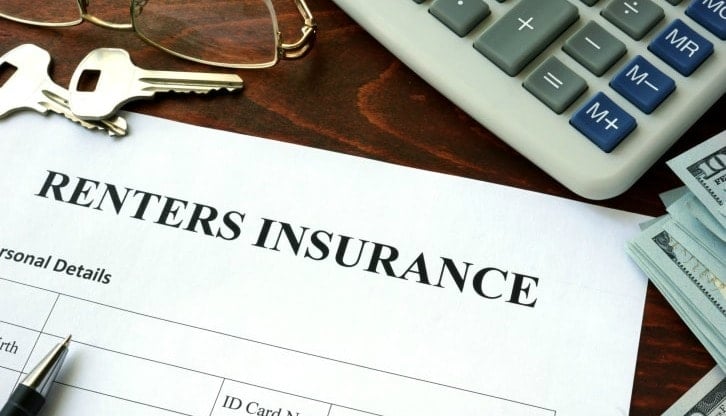Most landlords know and understand the importance of renters insurance. Not only does it protect your tenants in the case of an emergency, it adds an extra layer of protection to you and your Howard County rental property.
And while many tenants also share the belief that renters insurance is worth the small investment made in the form of monthly premium payments, there are still many who offer up common excuses for not purchasing renters insurance.

Top Myths of Renters Insurance
Myth 1. Renters insurance is too expensive and there are plenty of other uses I can find for my money each month.
The truth – The average renters insurance policy costs between $15 and $30 a month. Covering the cost of all of your personal belongings or the liability expenses for an accident that occurred on the premises will cost much more than that.
Myth 2. It is not worth the cost because I do not have that many valuables.
The truth – Renters insurance covers everything from electronics to clothing to household appliances and furniture. Even if your tenants own a small number of valuable items, the cost to replace them can add up quickly.
Myth 3. My landlord has insurance so I am covered.
The truth – Your landlord’s insurance will only cover structural damage to the building they own and lease to you. Coverage does not extend to your personal belongings and does not protect you from being liable should you cause the damage or someone get injured.
Due to these common excuses, it would not be unusual for you to require your tenant to purchase renters insurance in order to lease your Columbia rental property. However, this does not always go over well with the tenant looking to lease a home from you.
If you would like to require renters insurance be purchased by your tenants before signing a lease agreement, or would even just like to convince them that purchasing a renters insurance policy is a good idea, take a look at some ways you can do just that.
Not only can you help you tenant calculate the amount and type of coverage they may need, you can help them to see the value in having renters insurance while leasing from you.
4 Ways to Help Your Tenants See the Value of Renters insurance
1. Easy Calculation
The average Howard County tenant will have anywhere from $20,000-$30,000 in personal belongings. Far less expensive is the average monthly cost of having renters insurance to cover such expensive personal property.
The problem is, many tenants do not have a clue as to what the cash values of their possessions are. Things such as TVs and electronics are expensive items, but when an inventory is taken of everything owned by the tenant including furniture, bedding, jewelry, appliances, clothing and tools, it is often found that the cash value of their stuff has increased dramatically.
How landlords can help – Along with encouraging the purchase of renters insurance, direct your tenant to online calculators such as this one to help quickly and easily calculate a rough estimate of the total value of all of their belongings.

Here are some important reminders for calculating the baseline for a renters insurance policy:
- Cash value equals the value of a tenant’s belongings minus depreciation over time whereas replacement value is the cost to purchase everything brand new.
- Consider including additional living expenses (ALE) coverage to help with meals and hotels in the event of displacement.
- Include theft and not just burglary into the policy. With burglary, the tenant must prove a forced entry in order to cash in on a renters insurance policy.
2. Choosing a Deductible
For tenants who are not familiar with how renters insurance works, it is important that they know that it is similar to any other insurance policy they may have, such as health insurance.
Each month a premium will be paid to the insurance company responsible for covering the tenant’s personal belongings. In the event of an emergency such as a fire, the tenant will then pay an agreed upon deductible amount and have the rest of the possessions paid for by the insurance company.
How landlords can help – Offer some useful questions for your tenant to ask the insurance company when looking into the right renters insurance policy that can help determine a policy limit and deductible amount. For instance, recommend they get answers to questions like how the insurance policy applies to roommates, what each insurance term means, what optional coverage might be available and why it would be helpful, and how liability coverage is included.
Most renters insurance deductibles will range from $250-$2,000 or more depending on how much coverage the tenants require. Tenants should be aware that the lower the deductible the higher the premium, and vice versa.
3. Additional Coverage
Standard renters insurance usually only covers unintentional accidents, theft, fire, hail, and rain up to the limits of the policy’s coverage. That leaves additional coverage types your tenant’s may be interested in considering while leasing your Laurel rental home.
Liability Coverage
This type of coverage typically protects tenants against lawsuits for bodily injury or property damage that they or their guests cause other people. It also generally pays for damage pets may cause other people. It is recommended tenants start their policy coverage at $100,000.
Floaters
Also known as scheduled personal property coverage, floaters allow tenants the option to increase the coverage of certain items, such as an expensive piece of jewelry. It is important to note that each individual item must be covered individually.
Weather-Related Coverage
Coverage for damage due to floods, earthquakes, hurricanes, and tornadoes are not typically covered under a standard renters insurance policy. Both the American Red Cross and the National Oceanic and Atmospheric Administration have compiled a map determining the general risk each state has for experiencing some of those natural disaster types that can be used to see if excess coverage is needed.
How landlords can help – Mention some of the different types of additional coverage to your tenants. If your Elkridge rental property is susceptible to flood and hurricane damage encourage your tenants to purchase related coverage.
4. Encourage Documentation
More than half of Americans have no inventory of their personal possessions, and even less people have photographic proof of personal property or receipts proving ownership. This lack of documentation puts your tenants at risk of receiving inadequate coverage.
How landlords can help – Recommend that your tenants take inventory regularly of their personal possessions and to keep the list updated. This will prove helpful in applying for renters insurance as well as in the payout process in the event of a loss or damage.
Final Thoughts
In the end, it is suggested that your Howard County tenants purchase a decent renters insurance policy. Not only is it in their best interest to protect their own personal belongings, it helps protect you as well in the case of an accident or negligent damage. By having a renters insurance policy in place, if something were to happen to your investment property, the renters insurance policy will be targeted first. This may possibly prevent you from having to file a claim with your own insurance company.
If you own a rental home in the Howard County area and want some help drafting a lease agreement that requires your tenants to have renters insurance during their tenancy, contact Bay Management Group today. Knowledgeable about legally compliant lease agreements, as well as active in inspecting your home for negligent behavior, Bay Management Group can give you the peace of mind that your property is being well cared for and is protected, in more ways than one.
